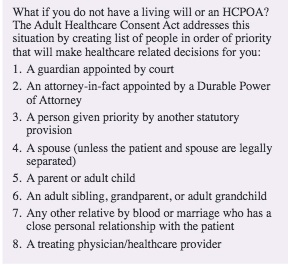by H. Stewart James, Babb & Brown, P.C., Attorneys at Law
It’s a scenario that plays out not only in movies, but all too often in real life. A terrible accident or tragic illness leaves someone unable to communicate. Distressed family members argue. They have different ideas of what their loved one’s wishes may be, and they simply cannot agree on how to move forward. Whatever the situation, having to make medical decisions for someone else can cause not only tension and heartache, but it can also create a delay in much needed treatment.
Have you considered what will happen to your family if you are in this situation? Who will make medical decisions for you? Will you receive preferred medical care and treatment?
The choice is yours. Advance directives are legal documents that allow you to convey your wishes to family, friends, and healthcare professionals in the event that you are unable to communicate with your doctors. There are several types of advance directives, and it is important to understand the differences between them.
The South Carolina Death with Dignity Act allows for a “Declaration for a Natural Death” or a living will. A properly executed living will allows you to choose to whether to withhold or provide medical treatment under certain circumstances. Two examples are “permanent unconsciousness” or “being in a persistent vegetative state”, and having a “terminal condition”, which is considered “an incurable or irreversible condition that could cause death within a reasonably short period of time if life sustaining procedures are not used.”
Life sustaining procedures are those that would serve only to prolong the dying process, such as providing nutrition and hydration.
While a living will would protect you under these circumstances, what will happen if you are seriously injured in an accident? A Healthcare Power of Attorney (HCPOA) is a legal document that allows you to appoint a trusted person who can make healthcare decisions for you in the event you cannot make them yourself. Healthcare providers are legally bound to honor the appointed agent’s decisions as if you were making the decisions yourself.
If you elect to sign an HCPOA but not a living will, you may be transferring end-of-life decisions to your appointed agent. However, by signing a living will and an HCPOA, you will be making all decisions concerning life-sustaining treatment, while allowing your agent to make all other healthcare decisions. The living will would not allow the appointed agent to override your legally expressed dying wishes.

While this law is nice to have in an emergency situation, it allows for potential disputes among people with equal priority. For example, what if you have no guardian, Durable Power of Attorney, or spouse but have two adult children?
What if one child instructs the hospital to remove life support but the other child wants life support to remain? In this situation, the court would be forced to make healthcare decisions for you. Like any legal action, this could be time-consuming and expensive not to mention stressful for your family.
Unless you want a court making healthcare decisions for you or a distant relative guessing your wishes, it is imperative that every person over the age of 18 have a properly executed living will and HCPOA. Remember, advance directives do not come into play unless you, the patient, are incapacitated and unable to speak for yourself. These documents may be revoked or changed at any time prior to you becoming in competent. By signing a living will and an HCPOA, you are ensuring that you always have a voice in your healthcare decisions.



